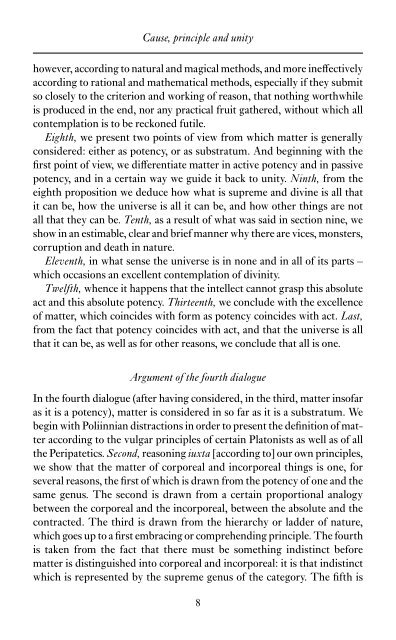You also want an ePaper? Increase the reach of your titles
YUMPU automatically turns print PDFs into web optimized ePapers that Google loves.
<strong>Cause</strong>, principle and unity<br />
however, according to natural and magical methods, and more ineffectively<br />
according to rational and mathematical methods, especially if they submit<br />
so closely to the criterion and working of reason, that nothing worthwhile<br />
is produced in the end, nor any practical fruit gathered, without which all<br />
contemplation is to be reckoned futile.<br />
Eighth, we present two points of view from which matter is generally<br />
considered: either as potency, or as substratum. And beginning with the<br />
first point of view, we differentiate matter in active potency and in passive<br />
potency, and in a certain way we guide it back to unity. Ninth, from the<br />
eighth proposition we deduce how what is supreme and divine is all that<br />
it can be, how the universe is all it can be, and how other things are not<br />
all that they can be. Tenth, as a result of what was said in section nine, we<br />
show in an estimable, clear and brief manner why there are vices, monsters,<br />
corruption and death in nature.<br />
Eleventh, in what sense the universe is in none and in all of its parts –<br />
which occasions an excellent contemplation of divinity.<br />
Twelfth, whence it happens that the intellect cannot grasp this absolute<br />
act and this absolute potency. Thirteenth, we conclude with the excellence<br />
of matter, which coincides with form as potency coincides with act. Last,<br />
from the fact that potency coincides with act, and that the universe is all<br />
that it can be, as well as for other reasons, we conclude that all is one.<br />
Argument of the fourth dialogue<br />
In the fourth dialogue (after having considered, in the third, matter insofar<br />
as it is a potency), matter is considered in so far as it is a substratum. We<br />
begin with Poliinnian distractions in order to present the definition of matter<br />
according to the vulgar principles of certain Platonists as well as of all<br />
the Peripatetics. Second, reasoning iuxta [according to] our own principles,<br />
we show that the matter of corporeal and incorporeal things is one, for<br />
several reasons, the first of which is drawn from the potency of one and the<br />
same genus. The second is drawn from a certain proportional analogy<br />
between the corporeal and the incorporeal, between the absolute and the<br />
contracted. The third is drawn from the hierarchy or ladder of nature,<br />
which goes up to a first embracing or comprehending principle. The fourth<br />
is taken from the fact that there must be something indistinct before<br />
matter is distinguished into corporeal and incorporeal: it is that indistinct<br />
which is represented by the supreme genus of the category. The fifth is<br />
8

















